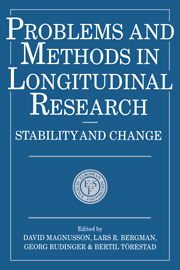Book contents
- Frontmatter
- Contents
- Contributors to this volume
- Foreword
- Preface
- 1 Studying individual development: problems and methods
- 2 Modeling individual and average human growth data from childhood to adulthood
- 3 Intraindividual variability in older adults' depression scores: some implications for developmental theory and longitudinal research
- 4 Now you see it, now you don't – some considerations on multiple regression
- 5 Differential development of health in a life-span perspective
- 6 Assessing change in a cohort-longitudinal study with hierarchical data
- 7 Statistical and conceptual models of ‘turning points’ in developmental processes
- 8 Qualitative analyses of individual differences in intra- individual change: examples from cognitive development
- 9 Application of correspondence analysis to a longitudinal study of cognitive development
- 10 Event-history models in social mobility research
- 11 Behavioral genetic concepts in longitudinal analyses
- 12 Genetic and environmental factors in a developmental perspective
- 13 Structural equation models for studying intellectual development
- 14 Longitudinal studies for discrete data based on latent structure models
- 15 Stability and change in patterns of extrinsic adjustment problems
- Index
1 - Studying individual development: problems and methods
Published online by Cambridge University Press: 27 April 2010
- Frontmatter
- Contents
- Contributors to this volume
- Foreword
- Preface
- 1 Studying individual development: problems and methods
- 2 Modeling individual and average human growth data from childhood to adulthood
- 3 Intraindividual variability in older adults' depression scores: some implications for developmental theory and longitudinal research
- 4 Now you see it, now you don't – some considerations on multiple regression
- 5 Differential development of health in a life-span perspective
- 6 Assessing change in a cohort-longitudinal study with hierarchical data
- 7 Statistical and conceptual models of ‘turning points’ in developmental processes
- 8 Qualitative analyses of individual differences in intra- individual change: examples from cognitive development
- 9 Application of correspondence analysis to a longitudinal study of cognitive development
- 10 Event-history models in social mobility research
- 11 Behavioral genetic concepts in longitudinal analyses
- 12 Genetic and environmental factors in a developmental perspective
- 13 Structural equation models for studying intellectual development
- 14 Longitudinal studies for discrete data based on latent structure models
- 15 Stability and change in patterns of extrinsic adjustment problems
- Index
Summary
INTRODUCTION
The ultimate goal for developmental research is to understand and explain the developmental process underlying an individual's way of thinking, feeling, acting and reacting at a certain stage of the life process.
In order for empirical research to contribute effectively to this goal there are three crucial aspects of the research strategy which are important:
the problem under consideration,
the data used to reflect the structures and processes involved, and
the methods applied for data treatment.
An important prerequisite for the formulation of relevant problems is a careful analysis of the phenomena, in this case the functioning of the individual at the appropriate level of the structures and processes relevant for the problem. Too often problems are formulated with reference to theories which have not been anchored in careful observation and analysis of the phenomena, a circumstance which has contributed to much artificial theorizing and meaningless empirical research.
The crucial importance of using data relevant to the character of the problem, with respect to reliability, validity, level of generalization, etc., was comprehensively dealt with in an earlier volume in this series (Magnusson & Bergman, 1990).
The focus of this volume is on methods for data treatment. The emphasis is on the importance of careful linking of methods for data treatment to the character of the substantive problem under consideration in the specific case. The choice of method for data treatment should always be made with reference to an analysis of the structures and processes relevant to the problem under consideration.
- Type
- Chapter
- Information
- Problems and Methods in Longitudinal ResearchStability and Change, pp. 1 - 27Publisher: Cambridge University PressPrint publication year: 1991
- 19
- Cited by



